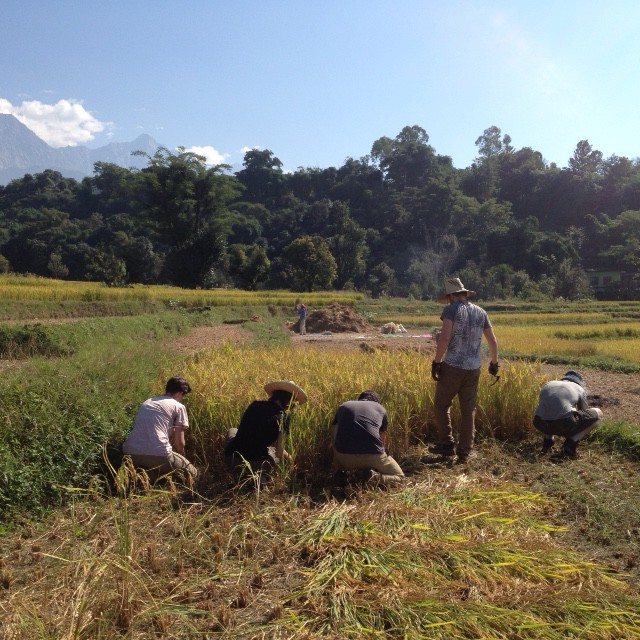As an aspiring engineer, I find the Dev Bala farm and all of its inner workings to be fascinating. At first glance, the rural and laid-back atmosphere of the land would encompass the same industrial and clockwork stereotypes that come with engineering. Yet in more ways than one, it is a self-sustaining machine that surpasses my previous conception of what farming is all about. Every task is carried out with precision and efficiency. When cutting up tree branches with a machete for fire wood, we were taught that the best angle of attack is about 45 degrees, as to not quite go against the wood’s grain, yet distribute the cutting force in the best way possible. Whether its picking ginger plants, working in the scorching heat of the rice fields, or turning over the soil for new seeds, everything is broken down to a science.
I was most heavily reminded of my study of choice when we burned straws of grass and weeds in a fire. What I previously learned about combustion in thermodynamics was bursting to life before me, triggering a fascination of its many nuances. We already knew the greener plants, which retained more water, were significantly more difficult to burn. I knew the science behind this; water molecules are most densely compact in liquid form and require more energy for its bonds to be broken and form with other reactants.
I stood for a while and watched the flames and tried to answer some of the many of the questions that came to mind: How much more energy was required to burn wetter plants? What ratio of dry plants to wet plants should be in the pile at any point? Does position of each plant matter? How could we make this process more efficient? I just stood there pondering all of the variables, what ifs, and all the potential problems.
Then my OE Matt reminded me that there would be no fire if I didn’t help put any plants in, and then continued to help out with the task at hand.
Unlike many things instilled in me by my studies, the farm didn’t seem to have any requirements, quotas, or set schedule. Although there were many questions of pertaining to the duration of our work day, at no point did someone ask “how long will (insert task here) take?” The best way to go about it was to simply focus on the task at hand, and not its implications on the past or the future.
At the end of the day, I had two options. I could ponder over what would’ve made the fire faster and worry about all the details all night long, or I could sip on some chai tea, enjoy the sunset over the vast rice fields, and laugh with the rest of the group in gleeful conversation. The choice was obvious, and the chai tea was delicious.
Even after only two weeks, my trip to India has taught me something that engineering simply can’t. I think Master Oogway from Kung Fu Panda put it best:
“Yesterday is history, tomorrow is a mystery, but today is a gift, that is why it is called the present.”

